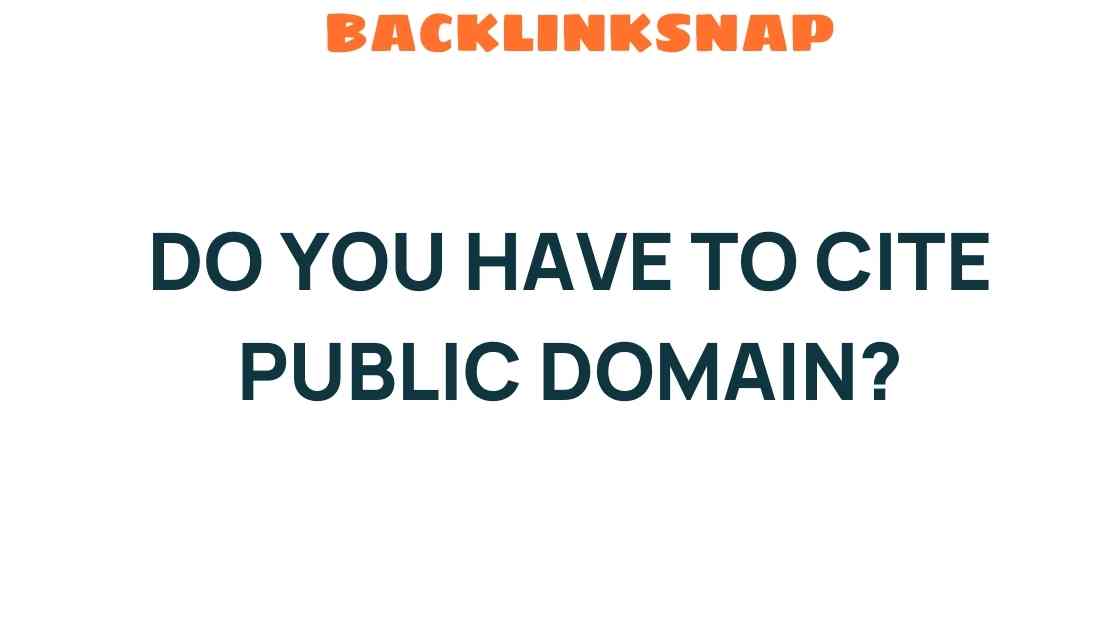Do You Have to Cite Public Domain Works?
Understanding public domain works and their implications in the realm of copyright law can often feel like navigating a maze. Whether you’re a student, researcher, or creative professional, the question of citation arises frequently: if a work is in the public domain, do you still need to cite it? This article will unravel this mystery, exploring the nuances of public domain works, their legal implications, and best practices for maintaining academic integrity.
What is Public Domain?
The public domain refers to creative works that are not protected by copyright law. This means that anyone can use these works without seeking permission or paying royalties. Typically, works enter the public domain when:
- The copyright has expired, which varies by jurisdiction.
- The creator explicitly places the work in the public domain.
- The work is a product of the U.S. government.
Some notable examples of public domain works include classic literature like Shakespeare’s plays, certain historical documents, and various scientific publications. However, just because these works are free to use doesn’t mean that the conversation about citation ends there.
The Importance of Citation
Citation serves multiple purposes in academic and creative contexts. It provides credit to original authors, allows readers to trace the source, and upholds the ethical standards of intellectual property. Even when using public domain works, citation is significant for several reasons:
- Academic Integrity: Citing sources, even those in the public domain, demonstrates a commitment to integrity in scholarship. It shows that you respect the contributions of others.
- Contextual Clarity: Providing a citation helps to clarify the context in which you are using the work, which can enrich your own arguments or narratives.
- Research Practices: Good research practices advocate for transparency and traceability. Citing works, regardless of their copyright status, contributes to a well-documented body of research.
Legal Implications of Citing Public Domain Works
While public domain works can be freely used, the legal implications surrounding citation might still confuse many. The general rule is that you are not legally obligated to cite public domain works. However, failing to do so can have unintended consequences such as:
- Misrepresentation: Without proper citation, a reader might assume that you are the original creator of the work or that you have created something new. This can lead to potential claims of plagiarism.
- Academic Consequences: In academic settings, failing to cite sources—even those in the public domain—can lead to accusations of academic dishonesty, which may have serious repercussions.
Thus, it’s clear that while you may not be legally required to cite public domain works, doing so is often in your best interest, both ethically and practically.
Best Practices for Citing Public Domain Works
When it comes to citing public domain works, there are some best practices to keep in mind:
- Use a Standard Format: Follow the citation style that is most relevant to your field of study or project (APA, MLA, Chicago, etc.).
- Provide Context: Include information about the work’s origin, such as the author, title, publication date, and any relevant historical context.
- Be Transparent: If you’re using a public domain work as a basis for your own creative work, clarify how you’re utilizing it to avoid any confusion.
For instance, if referencing Shakespeare’s “Hamlet,” you might cite it as follows: Shakespeare, William. “Hamlet.” Public domain, 1603. This informs readers of the work’s status and its historical significance.
Common Misconceptions About Public Domain and Citation
As with any legal concept, there are several misconceptions regarding public domain works and citation. Here are a few of the most common:
- Public Domain Means No Attribution: While legally you may not have to cite, ethically and academically, you should.
- All Old Works are Public Domain: Not all works from the past are public domain. Always verify the copyright status before using any work.
- Public Domain is Universal: Copyright laws vary by country, so a work may be in the public domain in one jurisdiction but not in another.
FAQs About Citing Public Domain Works
1. Do I need to cite a public domain image?
While you are not legally required to cite a public domain image, doing so is recommended to acknowledge the original creator and provide context.
2. What happens if I don’t cite a public domain work?
While there are no legal penalties for not citing public domain works, failing to do so can lead to accusations of plagiarism and undermine your credibility.
3. Are there modern works that are public domain?
Yes, works can enter the public domain after the copyright expires, which often occurs many years after the creator’s death. Always check the copyright status.
4. Can I modify public domain works without citation?
You can modify public domain works without needing permission, but citing the original work is advisable to indicate your sources.
5. How do I find public domain works?
There are various online resources, including Project Gutenberg and the U.S. Government Publishing Office, where you can find public domain works.
6. Is there a difference between public domain and Creative Commons?
Public domain means no copyright restrictions, while Creative Commons licenses allow authors to specify how their works can be used, often requiring attribution.
Conclusion
In conclusion, while you may not be legally required to cite public domain works, doing so is best practice. It upholds academic integrity, enhances the clarity of your work, and fosters a culture of respect for intellectual property. Understanding the nuances of public domain and citation not only enriches your research practices but also ensures that you contribute positively to the academic and creative communities. Remember, citation isn’t just about legality; it’s about respect, transparency, and scholarly rigor.
For further reading on copyright law and public domain works, check out the U.S. Copyright Office. For more on citation practices, visit this helpful guide.
This article is in the category SEO Optimization and created by BacklinkSnap Team




